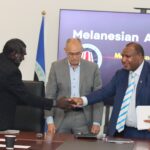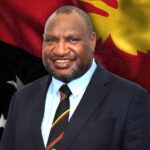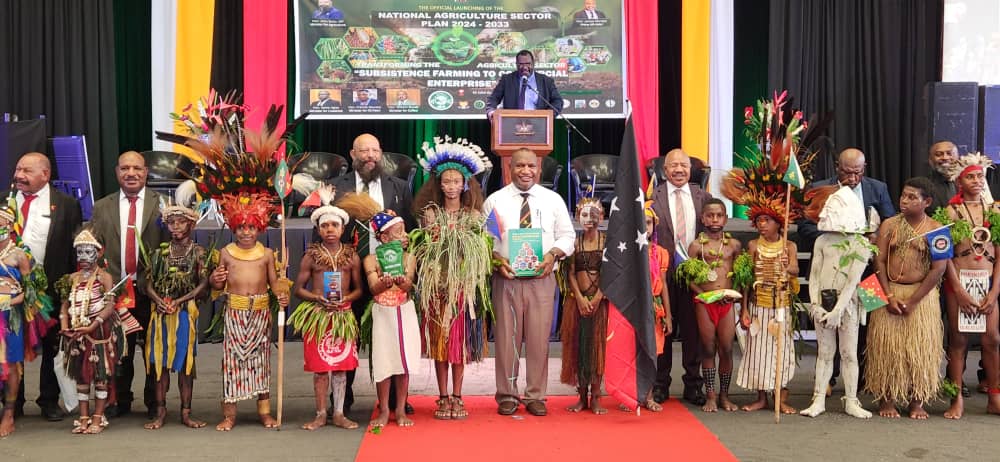Prime Minister Hon. James Marape today launched the much-needed National Agriculture Sector Plan (NASP) 2024 – 2033, the roadmap for his government to unlock the enormous agriculture potential of Papua New Guinea and, in the process, empower its citizens.
In so doing, PM Marape tasked the Agriculture Sector to utilize the Plan to con- tribute K30 billion to the economy by 2033 and also contribute to the 1 million job creation target by the same year.
In a ceremony at Sir John Guise Indoor Complex attended by members of the Agriculture sector from both the Public Service and business community, Prime Minister Marape stood at the podium and watched as children – all dressed in traditional attire marking the 21 provinces and the special region of Bougainville – walked up to him carrying a sample of an agriculture commodity with the printed NASP and the National Agriculture & Livestock Implementation Plan 2024 – 2033.
The children’s activity was a symbolic representation of the inclusivity and hope imbedded in the plan to drive agriculture across the country and economically empower rural Papua New Guineans in agribusiness and agriculture-related ventures.
Prime Minister Marape said, “Agriculture is the core policy of my party, Pangu. It is a sleeping economic giant that has my government’s undivided support to unlock this real treasure of the county.
“When I advocated for Papua New Guinea to become the Richest Black Christian, I knew we have all the fundamentals needed to make it happen.
“We have land which we still own; we can easily make the switch from subsistence to commercial agriculture; and the government is there to work with the Private Sector to find markets for our people. This plan captures my government’s vision for an agriculture-based economy.
“I am delighted that 85 percent of the population will gain more benefits from NASP investments. It has created a platform for the local, district, provincial and national governments, private investors and foreign direct investors to venture into strategic partnership with landowners and other stakeholders for development of large-scale commercial agriculture and downstream processing space.
“This ensures active participation in the economic development by everyone where no one is left behind, from where we will secure financial, nutritional and food security for PNG,” said Prime Minister Marape.
The new NASP replaces the old Agriculture Development Plan 2007 – 2016, which expired seven years ago and was needing to be a lot more developed to capture the current government’s focus.
The Plan is aligned to the strategic goals of Vision 2050, PNG DSP 2010-2030 and the latest Medium Term Development Plan IV 2023-27, which prioritizes Agriculture Commercialization and Livestock Development as the cornerstone for sustainable socio-economic development of the country.
The targets to be delivered include Improved Food Supply/Security, increased income-earning opportunities for people, import replacement, improvement in the performance of the Agriculture Sector, creation of employment opportunities for all, and improvement in the quality of life.
NASP’s development came from a series of consultative workshops carried out in each of the four regions as well as meetings with heads of the commodity boards and development partners.







